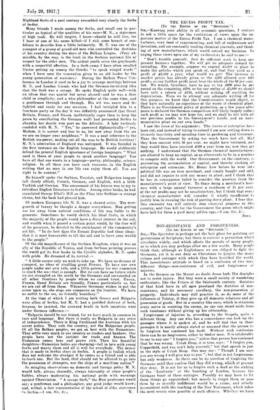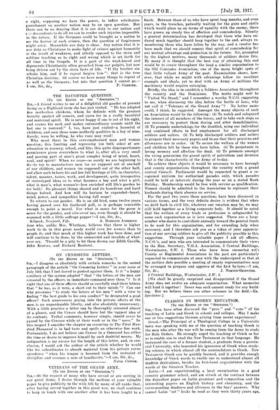NON-RESISTANCE AND FORGIVENESS.
Ito THE EDITOR or THE " SPECTATOR:1 SI2,—Th6 Spectator is perhaps not the best place for pointing out perversicaus of Scripture; but there is current a perversion which circulates widely, and which affects the morale of many people. as to which you may perhaps allow me a few words. Many people think that, although as Englishmen we are obliged to fight the Germans, yet it is our duty as Christians to (orgive the many crimes and Outrages with which they Mere horrified the world. This invertebrate attitude is Lased on a confusion of two veey different things—non-resistance of evil, and forgiveness to' injuries.
In the Sermon on the Mount no doubt Jesus bade His disciples not to resist injury. But they were a small society of wandering enthusiasts, like the Friars of the thirteenth century. Societies of that kind have in all ages practised the doctrine of non- resistance, and Its necessary corollary, the non-possession of property. Individuals may still practise it, as do some of the followers of Totem% if they give up all domestic relations and all possession of goods. But in a country like ours, which is straining every nerve in resisting the enemy, no one can stand aside front such resistance without giving up hie citizenship.
Forgiveness of injuries is, according to the Gospels, grate different thing. Any one who has a concordance can look up the passages where it is spoken of, and he will find that in those passages it is nearly always stated or assumed that the person to be forgiven has confessed his fault. Without such confession there can be no forgiveness, either by God or man. It to intolerable to say to any one" I forgive you," unless that person has confessed that he was wrong. Uritsh Beep, it is true, says: "I forgive you, Copperfield, and you can't help yourself," but that speech is just in the style of TJriah Heep. One may eay "Though I tun sure you are wrong I will give way to you"; but that is not forgivenesa, but only weakness. So there can be no question of forgiving the Germans until they confess that they did wrong. which at present they deny. It is not for us to forgive such a deed as the sinking of the Lusitania ' or the bombing of London, because the Germans boast of these outrages. Possibly we may have to let these things go unpunished; but merely to forget them or peas them by as morally indifferent would be a crime, and utterly inconaistent with the teaching of the New Testarnent, a-hich taker; the most severe view possible of such offences. Whether we have
a right, supposing we have the power, to inflict retributive punishment on another nation may be an open question. But there can be no denying that it is our duty to our nation and Sro descendants to do all we can to render such injuries impossible in the future. If the Germans could be brought as a nation to see the horror of such crimes, then the question of forgiveness might arise. Meanwhile our duty is clear. Any notion that it is our duty as Christians to make light of crimes against humanity is the result of weakness, and utterly opposed to the stern and sublime teaching as to right and wrong which to set forth for all time in the Gospels. It is a part of the weak-kneed and degenerate Christianity often preached from our pulpits, but now being driven out by the stern facts of life, "If thy brother sin rebuke him, and if he repent forgive him ": that is the true Christian doctrine. Of course we have many things to repent of as well as the Germans; but into that question I cannot go.-



































 Previous page
Previous page